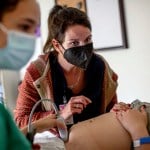The out-of-pocket cost of giving birth, with insurance is $2,854, per a new analysis released Wednesday by the nonpartisan Kaiser Family Foundation (KFF).
The analysis comes on the heels of the Supreme Court’s landmark decision to overturn Roe v. Wade, the 1973 case that guaranteed the right to an abortion. The June 24 decision gave states the power to ban the procedure. In the past two-and-a-half weeks, eight states have begun enforcing total abortion bans. Three more states are actively banning the procedure for people beyond six weeks of pregnancy.
Giving birth is only the first expense — raising a child poses its own financial burden, and previous research has shown that people who are denied an abortion face significant economic harm. A project known as the Turnaway Study found that 72 percent of people who were unable to access a desired abortion lived in poverty, compared with 55 percent of those who were able to terminate a pregnancy.
The KFF analysis builds on that understanding, illustrating just one of the excess costs assumed by giving birth. It offers a snapshot of the financial burden associated with pregnancy, and underscores that many Americans can’t afford to give birth.
“There will be more women who end up carrying a birth to term because they were not able to access a timely abortion or an abortion at all. And so what that can mean is that they have very significant costs,” said Cynthia Cox, a vice president at KFF and author on the study. “This is the first cost they would experience, the cost for birth. But of course there are other costs too — the cost for infants’ health care and their child care and support for many years after that.”
The out-of-pocket costs represent insurance-related bills related to pregnancy, labor and delivery, and postpartum care. The researchers analyzed a dataset of health insurance claims data from 2018 to 2020, comparing women between the ages of 15 and 49 who gave birth to those who didn’t. The data does not account for transgender and nonbinary people who may have given birth.
In total, pregnancy and childbirth for someone with private insurance costs about $18,865. Most of that is paid by the insurance plan but can result in higher insurance premiums down the line. So though the $2,853 figure is just one fraction of the overall cost, it represents the bills new parents have to pay on their own for a single birth.
By comparing cumulative medical costs for women who gave birth and those who did not, the analysis captured a fuller picture of how expensive giving birth can be. Out-of-pocket costs included psychiatric care, prenatal visits and other medical services that may not be labeled as “birth-related” but that directly result from being pregnant and carrying that pregnancy to term. Typically, birth cost analyses focus only on the cost of labor and delivery.
But if anything, the paper understates the cost of pregnancy, Cox said. The category of people who didn’t give birth includes people who were pregnant for a period of time but maybe miscarried or had an abortion. That means they incurred some pregnancy-related costs but not all of them.
The study looked at only people insured through large employer-sponsored private health plans. About half of all births are covered through private insurance — most others are insured through the public Medicaid program, which covers low-income people and has fewer associated out-of-pocket costs.
Of private plans, large employer-sponsored plans are typically the most generous. People with other forms of private coverage — small employer-sponsored insurance, or a plan purchased on the individual marketplace — likely faced even higher out-of-pocket medical expenses when giving birth, Cox said.
The findings underscore that, even as millions of Americans have lost their ability to terminate a pregnancy, giving birth remains unaffordable for many Americans. A previous KFF analysis found that 45 percent of single-person households did not have more than $2,000 available to pay for medical bills. Almost a third of multi-person households similarly lack sufficient cash to cover pregnancy and childbirth’s out-of-pocket costs.
“These costs are more than many families can afford,” the report said.
High-risk pregnancies, which more often result in Cesarean sections, also resulted in higher out-of-pocket expenses, per the paper. Cox suggested that could take on particular relevance in the post-Roe world. Abortion bans could result in more people with high-risk pregnancies giving birth — forcing patients to endure heightened, potentially life-threatening medical risk and also take on an even more financial burdens.
And, the analysis notes, out-of-pocket medical bills are just one cost issue. Because the KFF analysis looks at health insurance claims data, it doesn’t account for potential patient spending on over-the-counter medications that aren’t covered by insurance such as prenatal vitamins.
And there are costs beyond the medical bills a pregnant person faces. Upon giving birth, people may forgo wages if their job does not guarantee paid parental leave. Caring for a new child can mean incurring other new expenses such as infant health care and new non-medical costs. The loss of income, coupled with new financial burdens, increases new parents’ risk of medical debt. Current parents are also more likely to already have medical debt.
“This is maybe the smallest of the costs,” Cox said. “It’s the first of many.”







